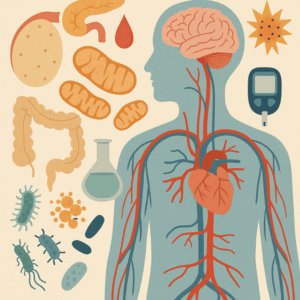Metabolic Psychiatry: A New Frontier in Mental Health Care
 What if we told you that your mind and your metabolism were deeply connected? That treating mental illness might require looking beyond neurotransmitters—and into blood sugar, gut bacteria, mitochondria, and inflammation?
What if we told you that your mind and your metabolism were deeply connected? That treating mental illness might require looking beyond neurotransmitters—and into blood sugar, gut bacteria, mitochondria, and inflammation?
Welcome to the cutting-edge field of Metabolic Psychiatry, where psychiatrists and scientists are beginning to see mental illness not just as a “chemical imbalance,” but often as a whole-body disorder with metabolic roots.
🌐 What is Metabolic Psychiatry?
Metabolic Psychiatry is the study of how metabolic dysfunctions—like insulin resistance, inflammation, and mitochondrial problems—affect mental health, and how treating these issues can improve psychiatric outcomes.
In this approach, we don’t just ask, “What’s happening in the brain?” We ask, “What’s happening in the entire body that’s affecting the brain?”
🔗 The Mind-Body Connection: 5 Key Links
1. Insulin Resistance and Depression
-
Insulin helps brain cells use glucose.
-
When the body becomes insulin-resistant (as in prediabetes or Type 2 Diabetes), the brain struggles to get enough energy.
-
This energy deficit can mimic or worsen low mood, brain fog, and fatigue.
-
Studies show that patients with treatment-resistant depression often have underlying insulin resistance.
2. Inflammation and Mental Illness
-
Chronic inflammation doesn’t just damage joints or the heart—it also impacts the brain.
-
Inflammatory markers (like CRP, IL-6, and TNF-α) are often elevated in people with major depression, schizophrenia, and bipolar disorder.
-
This inflammation can interfere with serotonin production, damage brain cells, and even affect neuroplasticity.
3. Mitochondria: The Brain’s Power Plants
-
Mitochondria produce energy for every cell—including neurons.
-
Dysfunctional mitochondria = poor energy production = symptoms like low motivation, mood swings, anxiety, and fatigue.
-
Mitochondrial dysfunction has been implicated in bipolar disorder, schizophrenia, and neurodegeneration.
4. The Gut–Brain–Metabolism Axis
-
Your gut microbiome influences neurotransmitters (like GABA, dopamine) and inflammatory processes.
-
A disturbed gut microbiota (dysbiosis) can contribute to anxiety, depression, cognitive changes, and even autism spectrum symptoms.
-
This also affects metabolism—gut inflammation can cause insulin resistance and vice versa.
5. Medication Effects on Metabolism
-
Many psychiatric medications (especially antipsychotics) lead to weight gain, high blood sugar, and cholesterol changes.
-
Monitoring and managing these side effects is crucial to long-term treatment success and quality of life.
🩺 Clinical Applications: Who Can Benefit?
| Condition | How Metabolic Psychiatry Helps |
|---|---|
| Depression | Screen for insulin resistance, B12 deficiency, inflammation |
| Bipolar Disorder | Support mitochondrial health, stabilize daily rhythms |
| Schizophrenia | Manage metabolic side effects of antipsychotics |
| ADHD | Investigate gut health, glucose crashes, nutritional deficiencies |
| Dementia | Control blood sugar, improve vascular health, reduce neuroinflammation |
| Autism Spectrum Disorders | Dietary modulation, mitochondrial support, anti-inflammatory strategies |
🧰 Tools We Use
In my clinical practice, when metabolic issues are suspected, we go beyond routine psychiatry tests and assess:
-
Fasting Insulin / HOMA-IR
-
HbA1c / Lipid profile
-
High-sensitivity CRP
-
Vitamin D, B12, Folate
-
Thyroid profile
-
Optional: Microbiome and stool markers (in select cases)
🥦 Treatment: It’s Not Just Pills Anymore
A metabolic psychiatry approach includes:
1. Lifestyle and Circadian Rhythm Support
-
Consistent sleep-wake cycles
-
Daylight exposure
-
Physical activity tailored to energy levels
2. Nutrition as Medicine
-
Anti-inflammatory diets (Mediterranean, low-glycemic)
-
In some cases, ketogenic diets for bipolar disorder, schizophrenia, and epilepsy-related behavior
-
Avoiding ultra-processed foods and sugar crashes
3. Supplements and Functional Support
-
Omega-3 fatty acids: mood and cognitive support
-
NAC (N-acetylcysteine): reduces oxidative stress, may improve schizophrenia and depression
-
Vitamin D, B-complex, Magnesium: foundational brain nutrients
4. Medications with Metabolic Benefits
-
Metformin for patients with insulin resistance and depressive symptoms
-
GLP-1 receptor agonists (like semaglutide) in emerging research
-
Avoiding overuse of medicines that worsen metabolic health
💡 Real-Life Case
Mr. R, a 37-year-old with chronic depression, had failed three antidepressants. On evaluation, we discovered he had undiagnosed insulin resistance (HOMA-IR = 3.4), low Vitamin D, and poor gut health due to years of antibiotics.
We initiated:
-
Low-glycemic diet with probiotics
-
Metformin and Vitamin D supplementation
-
Structured daily routine (IPSRT model)
In 10 weeks, his energy, mood, and motivation improved significantly—without changing his antidepressant.
🌱 Why This Matters
India is facing a double epidemic—rising rates of mental illness and metabolic disease. Metabolic psychiatry offers a holistic, science-backed approach that helps us address both.
Instead of overmedicating or labeling people as “non-compliant,” we now ask deeper questions:
Is the brain tired because the body is inflamed?
Are emotional symptoms a signal of biological distress?
🔍 Final Thoughts
Mental health is not just in the head—it’s in the gut, the blood, the mitochondria, and the metabolism. As psychiatrists, we must treat the brain within the body.
If you or someone you know is struggling with mood, energy, cognition, or motivation—and the usual treatments haven’t helped—it might be time to explore the metabolic side of mental health.
Dr. Srinivas Rajkumar T, M.D. (AIIMS), DNB
Consultant Psychiatrist
📍 Velachery , Chennai
📞 Call 85951 55808 | 🌐 www.srinivasaiims.com